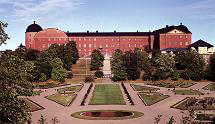Speaker
Prof.
Luca Venturelli
(Universita' di Brescia and INFN Brescia)
Description
Antihydrogen is now routinely produced at CERN by overlapping clouds of positrons and antiprotons. The mechanisms responsible for antihydrogen formation (radiative capture and the three-body reaction) are both dependent on the temperature of the positrons (T_e), though with a different weight.
Here we present a simple model of the behaviour of the positron temperature based on the main processes involved during antihydrogen synthesis, namely: antiproton-positron collisions, positron heating due to plasma expansion and cooling via the emission of synchrotron radiation. Simulations of the time evolution of T_e have been performed for the relevant working conditions of the CERN-AD experiments (but in particular ATHENA and ASACUSA) by changing the positron densities and the initial antiproton kinetic energies. A preliminary analysis comparing the experimental antihydrogen formation rates to those calculated using the present model results is also presented.
Primary authors
Prof.
Evandro Lodi-Rizzini
(Istituto Nazionale di Fisica Nucleare, Gruppo Collegato di Brescia, 25133 Brescia, Italy)
Prof.
Luca Venturelli
(Universita' di Brescia and INFN Brescia)
Prof.
Michael Charlton
(Department of Physics, College of Science, Swansea University, Singleton Park, Swansea SA2 8PP, UK)
Dr
Nicola Zurlo
(Dipartimento di Ingegneria dell'Informazione, Universita' di Brescia, 25133 Brescia, Italy & Istituto Nazionale di Fisica Nucleare, Gruppo Collegato di Brescia, 25133 Brescia, Italy)
Dr
Valerio Mascagna
(Dipartimento di Ingegneria dell'Informazione, Universita' di Brescia, 25133 Brescia, Italy & Istituto Nazionale di Fisica Nucleare, Gruppo Collegato di Brescia, 25133 Brescia, Italy)

